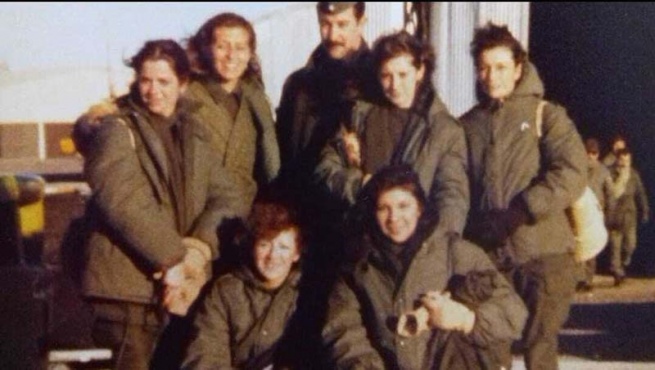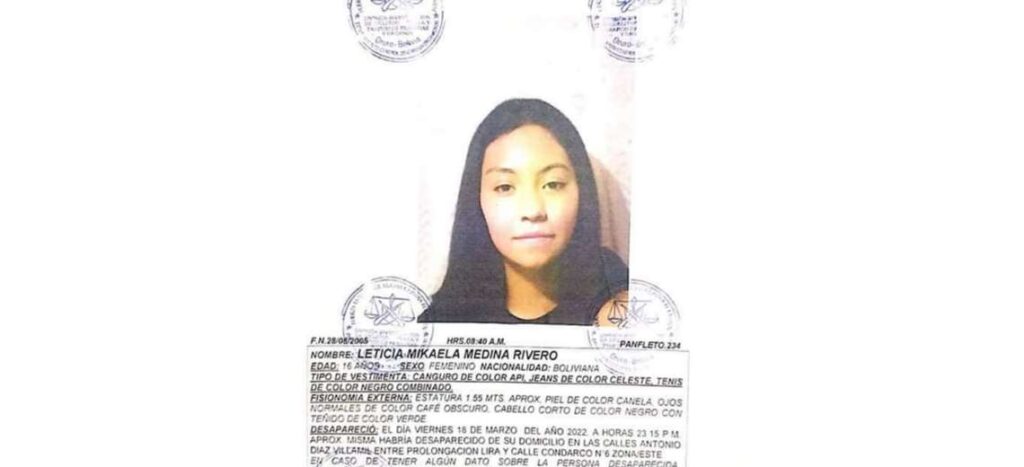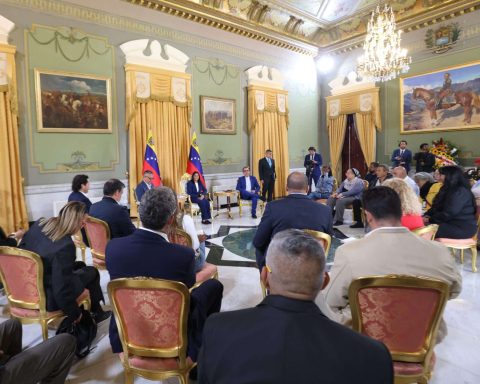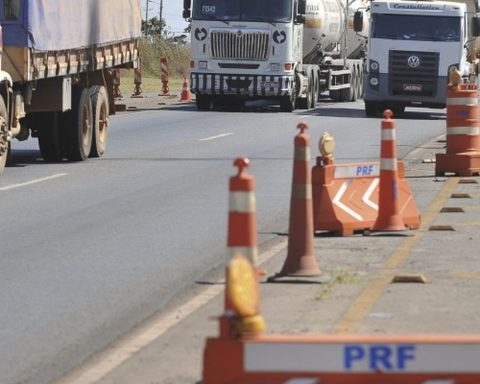A group of Argentine women, nurses, instrumentalists, diplomats and technicians, both civil and militaryentered the national history for his participation in the Malvinas wardespite the fact that the prevailing machismo in the hierarchical structures and in their superiors at that time conspired to relegate them to oblivion.
After the recovery of the Malvinas Islands during the Rosario operation in the early morning of April 2, 1982, the Argentine Army set up a field hospital in Puerto Argentino whose operating rooms did not have scrubbers, an exclusive task for women until 1985 when the first male students of this specialty in Argentina.
No authority seemed to have noticed this lack until the beginning of hostilities with the bombings of May 1, 1982, when the lack of instrumentalists made it difficult to care for the wounded who needed surgery.

In May 1982, Silvia Barrera was a 23-year-old instrumentalist who had been working for two years at the Central Military Hospital.was dating a doctor from that health center, and She was one of the 32 civilians who carried out this task in those operating rooms. and that they were summoned to a meeting by their superiors.
Barrera told Télam that “when the exhibition began, there were 32 girls in the room, and as they kept us up to date on how the situation was and what the risks were, those with children began to withdraw first. , then married women or those with dependent parents, and finally there are only five volunteers left; since we were less than the necessary ones, she made a similar call to the girls of the Campo de Mayo Hospital and from there one more was added “.
“When I told my boyfriend that I was going to the Malvinas, he told me that it couldn’t be possible for me to be deployed, a civilian and a woman, and that he, who was a doctor, a military man and a man, should not be called; that in no way could I accept. At that very moment and before assembling the bag I cut off the relationship, “he recalled with laughter.
The young civilian instrumentalists assigned by the Army to the hospital in Puerto Argentino took off from Buenos Aires towards Río Gallegos with summer uniforms and men’s boots several sizes larger, without eating and without documentation proving they were traveling; Thanks to a military doctor they found by chance, they were able to eat some sandwiches on the sidewalk and talk to be transferred to the helicopter that took them to the icebreaker Almirante Irízar, which served as a floating hospital along with the Bahía Paraíso polar transport.
“When I told my boyfriend that I was going to the Malvinas, he told me that it couldn’t be possible for me to be deployed, a civilian and a woman, and that he, who was a doctor, a military man and a man, should not be called; that in no way could I accept. At that very moment and before putting together the bag, I cut off the relationship”Silvia Barrera
The instrumentalist pointed out that “the first meeting with the crew of the Irízar was very tense, they had not been told that the instrumentalists were women and the sailors are very superstitious about the presence of women on ships, very recently the English had sunk the General Belgrano cruiser and the icebreaker’s deck chief, who was a recalcitrant male chauvinist, began to shout that they were going to sink us because we were on board”.
The six instrumentalists worked throughout the night of that June 8 in assembling the operating rooms of the icebreaker, a task that was not assigned to them and they had been asked as a favor because the plan was for them to disembark the next day in Puerto Argentino, while they were there. The ship received an inspection from the Red Cross and the United Nations, which formally registered their presence there, a document that later allowed them to certify their status as veterans.

Barrera indicated that “at dusk on June 9, the icebreaker arrived in Puerto Argentino but could not tie up because the British were shelling from sunset to sunrise, the next morning we were ready to disembark but we could not do so without having a degree military and as it was appropriate that they give us the lieutenant one, the male doctors who were on the ground objected because we were going to have the same one as them; the round trip was extended while there were patients waiting in the hospital and hostilities continued and finally the commander del Irízar closed the debate by announcing that we were staying on board to support the ship’s operating rooms”.
On board the icebreaker, the operatives did much more than assist in the surgeriesThey learned about types of wounds that are only seen during wars, when it was necessary they were from stretcher bearers, nurses, mothers or sisters; They also helped their patients write letters to their families and wrote down phone numbers to bring relief to a family when they could.
In this sense, the instrumentalist reflected: “we all occupy a role to which we were not used to, in daily life we almost always see the patient unconscious, but in the icebreaker we had to listen to their cries of pain, their moans, receive them conscious but with the open wounds due to the movement of the helicopters that brought them, making their beds and postoperative treatments. Towards the end they were brought directly from the battlefield and we had to cut off their clothes and bathe them without anesthesia to find the wounds under the mud.”
“The first meeting with the crew of the Irízar was very tense. The sailors are very superstitious about the presence of women on ships, very recently the English had sunk the cruiser General Belgrano and the deck chief of the icebreaker, who was a recalcitrant macho , began to shout that they were going to sink us because we were on board”Silvia Barrera
“In general, hospital ships sail accompanied by a combat ship, but since Argentina did not have too many ships, the Irízar and the Bahía Paraíso went alone, we began to realize how things were when we came across more and more often with the British fleet,” he added.
On June 13, British forces attempted a landing in RIBs, using the icebreaker’s silhouette to hide from lookouts on the shore, which led to a shootout between British troops and the ship’s crew, who never told them about it. episode to the instrumentalists until years later they found out about it through a documentary.
Barrera emphasized that “the differences that they could have with us because we were women, civilians and soldiers went into the background when we had to start caring for the wounded and a great work team was formed.”

And he added: “On the night of June 13, the commander of the icebreaker announced over the loudspeakers that a ceasefire would be signed the following day, but nobody expected it to be the end of the conflict. On the 14th, when we found out about the surrender, it was a shock because we had left Buenos Aires with the idea that we were winning“.
The end of the conflict ended with the thunderous symphony of bombs and artillery to which the instrumentalists had become accustomed, who from the deck of the icebreaker could clearly see how the Argentine soldiers came down from the mountains to be disarmed and taken prisoner.
From the Irízar, that group of young women shared the impotence of the entire crew as they watched the British forces lower the Argentine flag to hoist the British one, and also how some Argentine soldiers were left out in the open in their underwear.
The instrumentator pointed out that “until June 18 we were in front of Puerto Argentino receiving wounded, the rush was to rescue the largest number of soldiers to prevent prisoners from falling and get all the civilian personnel who were on the islands without grade out of the islands. military and was considered combat support like the workers of the Argentine Mail, the chaplains, those of National Roads or the journalists of Télam, ATC and Gente magazine.That day the British came up to inspect us and took the rolls of the camera that Dad gave me.”
Numerous ambulances waited for the icebreaker in the port of Comodoro Rivadavia from where the 350 wounded and the 40 evacuated civilians who were assisted by the instrumentalists were transferred to different health centers.
“After the war they made us notes in the media and that gave us a visibility that helped to show that women were in the Malvinas but also generated resentment on the part of the military who felt that in some way we stole their prominence or did not accept that we had more decorations that some of them”Silvia Barrera
Silvia recalled: “In Comodoro Rivadavia they put us on a plane whose seats had been removed to load more people, on the trip no one took us the note and we landed in Buenos Aires on Sunday June 20, which was celebrated Father’s Day and Flag Day. On Monday we returned to the hospital and it seemed that nobody cared about the Malvinas, everyone was talking about losing the World Cup in Spain and about the visit of John Paul II”.
“It was like we were carrying the loss,” he reflected.
“After the war they made us notes in the media and that gave us a visibility that helped to show that women were in the Malvinas but also generated resentment on the part of the military who felt that in some way we stole their prominence or did not accept that we had more decorations that some of them; the most valuable thing for us was always the acceptance of the veterans centers that integrated us and also It was very important that in 2012 the National State recognized us as veterans and also the women who served in the merchant marine and in the diplomatic corps.“, he stressed.
“Three years after the war I met the man who ended up being my husband and today I am the mother of Gonzalo, 35, Emiliano, 33, Paloma, 26, and Miranda, who is 20 and today is a volunteer soldier in the same hospital where I worked 42 years ago. years, I also have a 7-year-old grandson; over time I left the operating room, I studied different careers and today as head of ceremonial at the hospital I organize workshops and activities. The women were trained within the armed forces and today there are many with high degrees who occupy important roles, our history is part of that path”, he concluded.
Barrera together with her companions Susana Maza, María Marta Leme, Norma Etel Navarro, María Cecilia Ricchieri and María Angélica Sendes were the first women to be recognized as Malvinas veterans by the Argentine State in 1983, Mariana Florinda Soneira, Marta Beatriz Giménez, Graciela Liliana Gerónimo, Doris Reneé West, Olga Graciela Cáceres, Marcia Noemí Marchesotti, María Liliana Colino, Maureen Dolan, Silvia Storey and Cristina María Cormack later achieved this recognition from the Executive Power. .
In May 2021, the Argentine Air Force nurse Alicia Reynoso, who had served during the war in the relocatable hospital in Comodoro Rivadavia, was recognized as a veteran through the courts, a claim that her colleagues are also processing today.

















